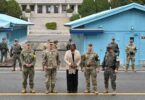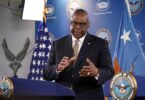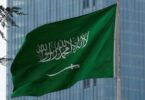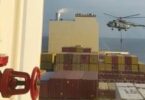BEIJING (CNN): China on Sunday appointed a US-sanctioned general as its new defense minister.
The country’s rubber-stamp legislature unanimously confirmed the appointment of General Li Shangfu, a veteran of the People’s Liberation Army’s modernization drive, during a session on Sunday.
Experts said the appointment would be closely watched by Washington given Li’s background, even though the post is viewed as largely diplomatic and ceremonial.
In 2018, the administration of former US President Donald Trump sanctioned Li and China’s Equipment Development Department – which he was in charge of at the time – for purchasing Russian weapons, including a Su-35 combat aircraft and a S-400 surface-to-air missile system.
His appointment was one of a series confirmed by China’s National People’s Congress during its Sunday sitting. Other senior appointments included four new vice premiers – Ding Xuexiang, He Lifeng, Zhang Guoqing, and Liu Guozhong.
Following their nomination by the new premier Li Qiang, all four will serve as vice premiers on the State Council, the body responsible for reviving China’s economy after three years of strict zero-Covid restrictions.
The appointment of Li Shangfu as defense minister comes at a time of increasingly strained relations between Beijing and Washington.
Defense experts told Reuters that his appointment likely reflected a reward for his work in modernizing China’s military.
In 2016, Li was named deputy commander of the PLA’s then-new Strategic Support Force, an elite body tasked with accelerating the development of China’s space and cyber warfare capabilities. He was then appointed head of the Equipment Development Department of the Central Military Commission (CMC), China’s governing defense body, headed by the country’s leader Xi Jinping, Reuters reported.
Defense experts said Li’s history as a technocrat and aerospace engineer who worked in China’s satellite program would play a key part in his new role.
“The operational and technological background of the next Chinese defense minister is especially pertinent given that the PLA aims to become a world-class military by 2049,” James Char from Singapore’s S. Rajaratnam School of International Studies told Reuters.
“I think he has been elevated to this position because he’s delivered for Xi Jinping in key areas of modernisation,” Singapore-based security analyst Alexander Neill from Hawaii’s Pacific Forum think-tank told Reuters.
“This is someone who will have to hold their own in front of an international audience.”







